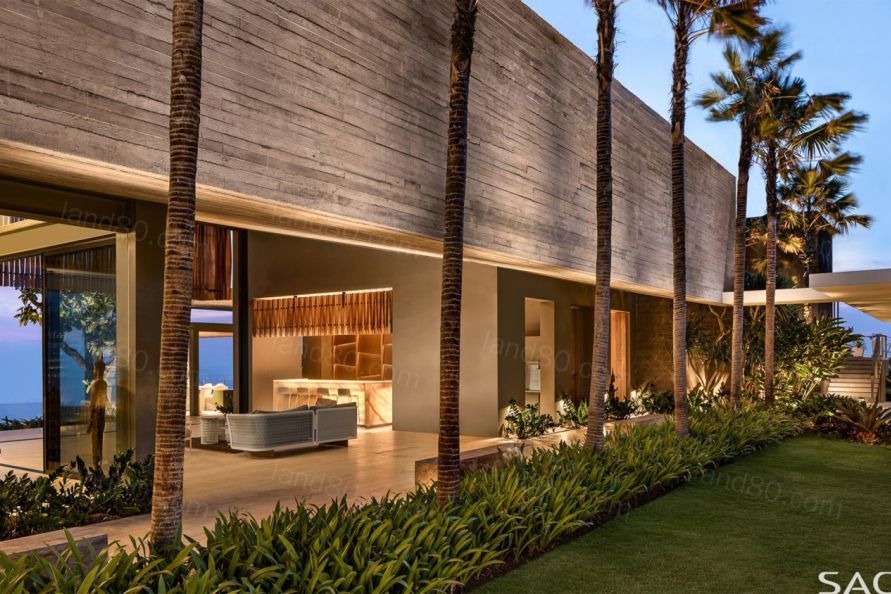这座由SAOTA设计的度假屋位于印尼巴厘岛武吉半岛西南端的Uluwatu,耸立在石灰岩悬崖边上。Ulu意为 "陆地的尽头",watu意为 "岩石",恰如其分地描述了野生、干旱半岛的荒野之美。Uluwatu还以拥有世界上最好的冲浪海滩而闻名,其陡峭的岩石悬崖提供了令人向往的高空海景。
This getaway home designed by SAOTA in Uluwatu, on the south‐western tip of the Bukit Peninsula of Bali, Indonesia, is dramatically perched high on a limestone cliff edge. Ulu means “land’s end” and watu means “rock”, which aptly describes the rugged beauty of wild, arid peninsula. Uluwatu is also known for having some of the world’s best surfing beaches, and its steep, rocky cliffs provide sought‐ after elevated ocean views.

SAOTA在一个东西向的场地上设计了这栋房子,东侧面向大海。这个场所的规模使得设计能够适应度假风格的布局,独立的套房和生活空间将室内和室外空间进行了分散的组合。一连串的庭院、花园和其它种植平台巧妙地交错在建筑中,将结构化和自然种植相结合,创造了与建筑有意义的景观融合。实际上,设计的部分灵感来自于当地遗迹,使得它看上去像是景观的一部分。
SAOTA designed the house on a large east‐west‐oriented site facing the ocean on the eastern side. The scale of the site allowed for the design to accommodate a resort‐inspired layout with separate suites and living spaces in a fragmented arrangement that weaves together indoor and outdoor spaces. A series of courtyards, gardens and other planted terraces are deftly woven into the architecture, combining structured and naturalistic planting and creating a sense that landscape and architecture are meaningfully integrated. In fact, the design was partly inspired by the way in which rocky ruins are, in time, reclaimed by the landscape, and come to seem almost as if they are part of it.

大面积的棕榈树林立的入口庭院创造了一种戏剧性的氛围,一座宏伟的楼梯漂浮在水景层叠之上。大石块砌成的墙烘托了进入房子的独特的设计感受。中央入口在到达时是一个焦点,在这里,休息室、餐厅和有顶棚的露台组成了建筑和亭子的蜂窝结构的核心,它们向外辐射,有机地与栽植的庭院和露台相通。西部大庭院与东部宽阔的景观形成了封闭对景。
A large palm‐lined entry courtyard creates a dramatic sense of arrival with a grand staircase floating over a cascading water feature. Monolithic stone‐clad walls add a singular design statement to the experience of entering the house. The centralised entrance creates a focal point on arrival, where a lounge, dining room and covered terrace form the core of the cellular arrangement of buildings and pavilions, which radiate outwards, organically interspersed with planted courtyards and terraces. A large courtyard to the west provides an enclosed counterpoint to the vast views to the east.


零散的建筑物和室外空间都摒弃了交通空间,促进了住宅的“可变性”,因此住宅是一种既可扩展又可"缩小"的灵活布局,以满足大小人群的需求。甚至在没有客人来访的情况下,主人也可以占据主套间和起居区,而不会感觉到额外的房间,因此,豪华的布置也不会失去尺度感。类似地,在整个规划中,入口、泳池露台和西院等大空间都以比例的私密性达到了平衡。
Not only does the fragmented nature of the building and outdoor spaces do away with internal passages entirely, but it also facilitates the home’s “chameleon quality”, a responsive arrangement that expands or “shrinks” to accommodate both small and large groups of people. Even if the owner was to visit without guests, he could occupy the main suite and living areas without being aware of the additional guest rooms, so the grandeur of the arrangement never loses a sense of intimacy. Similarly, throughout the plan, large spaces such as the entrance, pool terrace and western courtyard are balanced with intimately proportioned living spaces.


外部庭院与室内空间相互交融,建筑与景观之间不断交织。室内和室外的完美结合也是对巴厘岛气候的一个回应。一连串有遮挡的户外空间和庭院、亭子和露台,提供了不同程度的户外体验。多孔的墙面设计鼓励从海洋中流进自然冷却的交叉通风。在炎热的夏天,天气变得闷热时,住户可退至全封闭的空调休息和用餐区域。
The way in which architecture and external courtyards are interwoven means navigation through the buildings involves constantly crossing between architecture and landscape, facilitating a powerful sense of place. The seamlessly integrated indoor‐outdoor lifestyle is also a response to Bali’s climate. A range of covered outdoor spaces and courtyards, pavilions and terraces offer a variety of outdoor experiences with varying degrees of cover. The porous nature of the design encourages naturally cooling cross ventilation to flow in from the ocean. When the heat becomes oppressive, it’s possible to retreat into fully the fully enclosed, air‐conditioned lounge and dining areas.

就主要居住空间而言,巴厘岛建筑独特的乡土木制亭台楼阁用玻璃幕墙重新诠释,轻木屋顶以漂浮的混凝土屋顶形式重新设计,以板式混凝土制作而成。这种对当地建筑中普遍存在的木质结构的巧妙玩味,再次被提升到与项目规模相一致的高度。引人注目的屋顶坡度是对房屋东西方向气候的一个适当回应,既能引入晨光,又能打开东面的海景,同时还能遮挡来自西面的刺眼午后光线。
In the main living areas, the distinctive vernacular timber pavilions typical of Balinese architecture have been reinterpreted using glass curtain walling, and the local lightweight timber roofs have been re‐envisioned as a floating concrete roof form, beautifully crafted with board‐marked concrete. This subtly playful refence to the timberwork prevalent in the local architecture has once again been elevated in keeping with the scale of the project. The eye‐catching slope of the roof is a climatically appropriate response to the east west‐orientation of the house, inviting in the morning light and opening up ocean views to the east, while providing shelter from the harsh afternoon light from the west.


整座房子都是由混凝土纹理和当地的石材等天然装饰与独特的木制品叠加而成。立式幕布、细木工和装饰金属制品,如酒吧后面和雪茄吧中的铜色铝板,都以贴心的细节丰富了原材料。光滑的石灰石地板为脚下提供了奢华的体验,而连续的饰面给人一种稳重与凝重的感觉。优质的欧洲进口家具及装饰,低调奢华,与现代简洁的中世纪设计完美融合。
Throughout the house, the texture of the concrete and natural finishes such as local stone have been overlaid with distinctive timberwork. Vertical screens, joinery and decorative metalwork, such as the faceted bronzed aluminium behind the bar and in the cigar lounge, enrich the raw materiality with thoughtful details. Honed and unfilled travertine floors provide a luxurious finish underfoot while the continuity of the finishes imparts a sense of calmness and cohesion. High‐quality imported European furnishings and finishes introduce a sense of understated luxury with a contemporary take on pared‐back mid‐century design.


建筑位于雄伟壮观的巴厘岛南部海岸线的悬崖之上,迎合着热带的气候,有着广阔的舒适的户外空间,并且与当地的Uluwatu地形融为一体。
Nestled atop a cliff, with a sheer drop to the majestic southern Bali coastline, this split level retreat responds to the local tropical climate with generous sheltered outdoor spaces, and cohesive finishes to merge with the local Uluwatu terrain.


项目名称:Uluwatu
设计单位:SAOTA
项目年限:2018
项目位置:印尼 巴厘岛
占地面积:14170平方米
项目面积:1863平方米
项目类型:住宅
项目团队:Philip Olmesdahl, Mark Bullivant, Dominik George, Tasneem Mohamed & Carl Schmidt
合作单位:H+H Architecture
项目经理:Penjor Bali Mandiri
图片来源:©Adam Letch
Project: Uluwatu
Architect: SAOTA
Completed 2018
Site Area: 14 170 m2
Project Area: 1 863 m2
Project Type: Single Residential
Project Team: Philip Olmesdahl, Mark Bullivant, Dominik George, Tasneem Mohamed & Carl Schmidt
Architect of Record: H+H Architecture
Project Manager: Penjor Bali Mandiri
Photography: Adam Letch
|